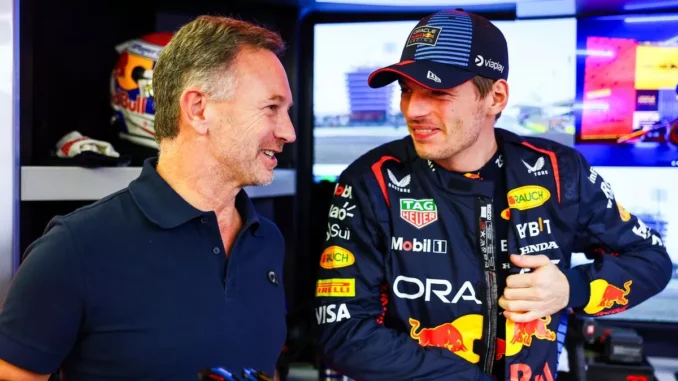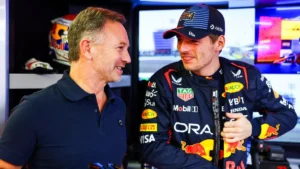
NEDERLANDSE🇳🇱 VERTALING HIERONDER
Max Verstappen and Christian Horner, two of the most dominant figures in Formula 1 in recent years, were met with a wave of boos at the 02 Arena during F1’s 75th Anniversary event, marking a surprising and somewhat dramatic moment in the sport’s history. The boos, which echoed throughout the venue, were directed at the Red Bull Racing duo, despite their recent string of successes in the sport. The event, which was meant to celebrate F1’s rich history, quickly became an arena for mixed emotions, highlighting the complex relationship between the sport’s dominant figures and the fans.

For Max Verstappen, the reigning World Champion, the booing came as a stark reminder of the mixed reception he has received from fans in recent years. While Verstappen’s skills on the track are undeniably exceptional, his rise to the top has been accompanied by a fair share of criticism. His dominant performances, especially in 2021 and 2022, left some fans feeling that the sport was losing its competitive edge. Verstappen’s repeated victories, combined with the unrelenting success of his team, Red Bull Racing, created a sense of predictability in what is meant to be a thrilling and unpredictable sport. In a way, Verstappen’s repeated dominance became a double-edged sword—while it secured him a place in the sport’s history books, it also led to frustration among fans who yearned for more variety and excitement in race results.
The boos during the 75th Anniversary event were not simply a reflection of Verstappen’s dominance, but also tied to the broader sentiment of fans who longed for more competitive racing. His success, which has been built on consistently excellent performances, strategic brilliance, and the superior Red Bull car, has left many fans of rival teams feeling disenfranchised. For fans of Ferrari, Mercedes, and even McLaren, Verstappen’s success has sometimes been perceived as a sign that their favorite teams are being left behind in the wake of Red Bull’s superior performance. This has resulted in Verstappen becoming the target of criticism from fans who see his dominance as a reflection of the unbalanced nature of the current competitive landscape.
Christian Horner, the team principal of Red Bull Racing, was not spared from the same treatment. As the architect of Red Bull’s incredible rise to the top of Formula 1, Horner has often been seen as a figure of authority who has masterminded the team’s success. However, like Verstappen, Horner’s association with Red Bull’s dominance has led to similar mixed reactions from fans. As the public face of the team, Horner is frequently linked to Verstappen’s success, and, for some, he represents the corporate side of the sport—an entity that has positioned Red Bull as the team to beat year after year. This association, coupled with Red Bull’s unrivaled performance, has made Horner a polarizing figure in the paddock, especially among fans of competing teams.
The boos at the 02 Arena, however, didn’t only stem from frustration with Red Bull’s dominance; they also highlighted deeper, underlying issues in Formula 1’s current narrative. The sport has been under increasing scrutiny in recent years, with many fans and pundits arguing that it has become too predictable, especially with the financial and technological disparities between the teams. Verstappen’s victories, while impressive, have often been marked by a lack of serious competition, as the Dutch driver’s dominant position within Red Bull has allowed him to extend his lead year after year. While it’s clear that Verstappen is one of the best drivers on the grid, the sport’s lack of competitive parity has led to frustrations about the overall structure of Formula 1.
Another contributing factor to the boos may have been Verstappen’s and Horner’s perceived attitudes off the track. Verstappen, while known for his candid and straightforward approach, has at times been criticized for his blunt remarks, which can come across as arrogance to some fans. His comments about rivals, the media, and even his own teammates sometimes contribute to an image of someone who is not always seen as humble in victory. Christian Horner, on the other hand, has been known for his confident and assertive leadership style, which can occasionally be seen as overbearing. For fans who prefer a more balanced or humble approach to success, these personalities can be off-putting.
Despite the boos, Verstappen and Horner were quick to shrug off the negative reception, recognizing that this type of reaction is often part and parcel of success at the top of any sport. Both have proven time and time again that they are capable of handling pressure and adversity, and it’s unlikely that the boos will affect their determination to continue dominating Formula 1. In fact, Verstappen’s remarkable mental fortitude is one of the reasons he has become the force he is today, and his ability to block out external noise has undoubtedly contributed to his consistency on the track.
In the end, the booing at the 02 Arena was a reflection of the broader frustrations within Formula 1, particularly among fans who feel that the sport’s competitive balance has been tilted in favor of one team and one driver. While Max Verstappen and Christian Horner remain two of the most talented and successful figures in modern F1, the reception they received during the anniversary event underscores the complexity of their place in the sport’s current narrative. The sport’s fans will always have diverse opinions, and while some may continue to cheer for Verstappen’s dominance, others may wish to see a new chapter in Formula 1 where the competition becomes more open and unpredictable. Regardless, Verstappen and Horner’s place in F1 history is secure, and the boos they received are simply another chapter in the ongoing saga of Formula 1’s evolution.
NEDERLANDSE🇳🇱 VERTALING
Max Verstappen en Christian Horner, twee van de meest dominante figuren in de Formule 1 van de afgelopen jaren, werden in de 02 Arena begroet met een golf van boegeroep tijdens het 75-jarig jubileumevenement van de Formule 1, wat een verrassend en enigszins dramatisch moment in de geschiedenis van de sport markeerde. Het boegeroep, dat door de hele locatie weerklonk, was gericht op het duo van Red Bull Racing, ondanks hun recente reeks successen in de sport. Het evenement, dat bedoeld was om de rijke geschiedenis van de Formule 1 te vieren, werd al snel een arena voor gemengde emoties, waarbij de complexe relatie tussen de dominante figuren van de sport en de fans werd benadrukt.
Voor Max Verstappen, de regerend wereldkampioen, was het boegeroep een harde herinnering aan de gemengde ontvangst die hij de afgelopen jaren van fans heeft gekregen. Hoewel Verstappens vaardigheden op het circuit onmiskenbaar uitzonderlijk zijn, is zijn opkomst naar de top gepaard gegaan met behoorlijk wat kritiek. Zijn dominante prestaties, vooral in 2021 en 2022, lieten sommige fans het gevoel krijgen dat de sport zijn competitieve voorsprong verloor. De herhaaldelijke overwinningen van Verstappen, gecombineerd met het onverbiddelijke succes van zijn team, Red Bull Racing, creëerden een gevoel van voorspelbaarheid in wat een spannende en onvoorspelbare sport zou moeten zijn. Op een bepaalde manier werd Verstappens herhaaldelijke dominantie een tweesnijdend zwaard: hoewel het hem een plek in de geschiedenisboeken van de sport opleverde, leidde het ook tot frustratie bij fans die verlangden naar meer variatie en opwinding in de raceresultaten.
Het gejoel tijdens het 75-jarig jubileumevenement was niet alleen een weerspiegeling van Verstappens dominantie, maar ook verbonden met het bredere sentiment van fans die verlangden naar meer competitieve races. Zijn succes, dat is gebaseerd op consistente uitstekende prestaties, strategische briljantie en de superieure Red Bull-auto, heeft veel fans van rivaliserende teams het gevoel gegeven dat ze niet meer in hun recht staan. Voor fans van Ferrari, Mercedes en zelfs McLaren is Verstappens succes soms gezien als een teken dat hun favoriete teams achterblijven in het kielzog van Red Bulls superieure prestaties. Dit heeft ertoe geleid dat Verstappen het doelwit is geworden van kritiek van fans die zijn dominantie zien als een weerspiegeling van de onevenwichtige aard van het huidige competitieve landschap.
Christian Horner, de teambaas van Red Bull Racing, werd niet gespaard van dezelfde behandeling. Als architect van Red Bulls ongelooflijke opkomst naar de top van Formule 1, werd Horner vaak gezien als een autoriteitsfiguur die het succes van het team heeft bedacht. Echter, net als Verstappen, heeft Horners associatie met Red Bulls dominantie geleid tot vergelijkbare gemengde reacties van fans. Als het publieke gezicht van het team, wordt Horner vaak in verband gebracht met Verstappens succes, en voor sommigen vertegenwoordigt hij de zakelijke kant van de sport – een entiteit die Red Bull jaar na jaar heeft gepositioneerd als het team om te verslaan. Deze associatie, gekoppeld aan Red Bulls ongeëvenaarde prestaties, heeft Horner tot een polariserende figuur in de paddock gemaakt, vooral onder fans van concurrerende teams.
Het gejoel in de 02 Arena kwam echter niet alleen voort uit frustratie over Red Bulls dominantie; ze benadrukten ook diepere, onderliggende problemen in het huidige verhaal van Formule 1. De sport staat de laatste jaren steeds meer onder druk, waarbij veel fans en experts beweren dat het te voorspelbaar is geworden, vooral met de financiële en technologische verschillen tussen de teams. Verstappens overwinningen, hoewel indrukwekkend, werden vaak gekenmerkt door een gebrek aan serieuze concurrentie, aangezien de dominante positie van de Nederlandse coureur binnen Red Bull hem in staat heeft gesteld om zijn voorsprong jaar na jaar uit te breiden. Hoewel het duidelijk is dat Verstappen een van de beste coureurs op de grid is, heeft het gebrek aan competitieve pariteit in de sport geleid tot frustraties over de algehele structuur van Formule 1.
Een andere factor die heeft bijgedragen aan het boegeroep was mogelijk de waargenomen houding van Verstappen en Horner buiten de baan. Verstappen, hoewel bekend om zijn openhartige en rechttoe rechtaan aanpak, is soms bekritiseerd vanwege zijn botte opmerkingen, die voor sommige fans arrogant kunnen overkomen. Zijn opmerkingen over rivalen, de media en zelfs zijn eigen teamgenoten dragen soms bij aan een beeld van iemand die niet altijd als nederig wordt gezien in de overwinning. Christian Horner staat daarentegen bekend om zijn zelfverzekerde en assertieve leiderschapsstijl, die soms als overheersend kan worden gezien. Voor fans die de voorkeur geven aan een meer evenwichtige of nederige benadering van succes, kunnen deze persoonlijkheden afschrikwekkend zijn.
Ondanks het boegeroep, waren Verstappen en Horner er snel bij om de negatieve ontvangst te negeren, omdat ze erkenden dat dit soort reacties vaak een vast onderdeel zijn van succes aan de top van elke sport. Beiden hebben keer op keer bewezen dat ze in staat zijn om met druk en tegenspoed om te gaan, en het is onwaarschijnlijk dat het boegeroep hun vastberadenheid om de Formule 1 te blijven domineren, zal beïnvloeden. Verstappens opmerkelijke mentale kracht is in feite een van de redenen dat hij de kracht is geworden die hij vandaag de dag is, en zijn vermogen om externe ruis te blokkeren heeft ongetwijfeld bijgedragen aan zijn consistentie.